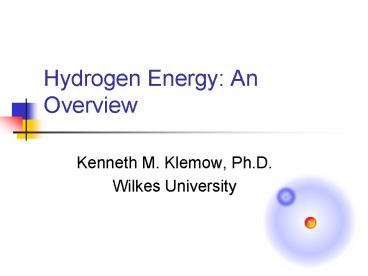Hydrogen Energy: An Overview - PowerPoint PPT Presentation
1 / 21
Title:
Hydrogen Energy: An Overview
Description:
Hydrogen Energy: An Overview Kenneth M. Klemow, Ph.D. Wilkes University * * * * * * * www.rise.org.au www.inl.gov/ www.fuelcellstocks.com Points to be covered Some ... – PowerPoint PPT presentation
Number of Views:485
Avg rating:3.0/5.0
Title: Hydrogen Energy: An Overview
1
Hydrogen Energy An Overview
- Kenneth M. Klemow, Ph.D.
- Wilkes University
2
(No Transcript)
3
Points to be covered
- Some hydrogen chemistry
- Hydrogen as an energy source
- Producing hydrogen
- Benefits of hydrogen as an alternative fuel
- Hydrogen power initiatives
- Disadvantages of hydrogen
- The WebQuest
4
Some hydrogen chemistry
- Lightest element (consists of only one proton and
one) electron - Isotopes include one or more neutrons
- Most abundant element in universe (75 by mass)
- Component of most stars as plasma
5
Hydrogen on earth
- Easily reacts with most other elements,
particularly oxygen, carbon, nitrogen, most
metals. - Carbon-hydrogen compounds are basis of organic
chemistry. - Basis of acid-base reactions.
- Occurs in diatomic form in atmosphere
- At typical temperatures and pressures, H2 is a
gas. - Rare (ca. 1 ppm) due to ease of escape
6
Molecular hydrogen is combustible
- 2 H2(g) O2 (g) ? 2 H2O(l)
- ?H -286 kJ/mol
- Burns at concentrations
- as low as 4.
- Produces flame visible
- only in UV spectrum
7
Primary industrial uses of hydrogen
- Create ammonia
- 3 H2 N2 ? 2 NH3
- Cracking of high molecular weight hydrocarbons to
form low m.w. hydrocarbons
8
Hydrogen as an energy source
9
Hydrogen internal combustion engines
Honda
Cadillac
London Olympics
10
Hydrogen fuel cells
Animation
www.next-generation.ca
11
Have many kinds of fuel cells
- Proton Exchange Membrane (PEM)
- Run at low temperatures, used in automotive
applications - Solid Oxide Fuel Cells
- Use ceramic electrolyte, central generating
stations - Alkaline Fuel Cells
- Long used by NASA in spacecraft
- Regenerative fuel cells
- Self contained, uses water and sunlight
- Microbial fuel cells
- Use bacteria and yeast under anaerobic cond.
12
How is hydrogen produced?
- Reacting metals with acids
- Zn 2 H ? Zn2 H2
- Processing hydrocarbons
- CH4 H2O ? CO 3 H2
- ?H 191.7 kJ/mol
- Hydrolysis of water
- 2H2O(l) ? 2H2(g) O2(g)
- ?G 474.4 kJ/mol
13
Commercial hydrogen production
- As a byproduct of coal gasification and natural
gas processing - Through use of electricity generated by burning
fossil fuels, nuclear, solar, hydropower,
geothermal, wind
14
The hydrogen economy
15
Elements of the hydrogen economy
- Hydrogen generation
- Centralized
- Distributed
- Hydrogen storage
- Hydrogen distribution
16
Benefits of hydrogen as a fuel
- Hydrogen exists in an unlimited supply
- Hydrogen is renewable
- Hydrogen is clean-burning
- Water is main byproduct
- No carbon dioxide released into air
- Hydrogen weighs less and generates more power
than hydrocarbon-based fuels. - Hydrogen burns faster and at a lower temperature
than conventional gasoline
17
The vision
- Convert vehicles to hydrogen power
- Establish extensive distribution system for
hydrogen - Produce massive amounts of hydrogen
- No worries about carbon if using nuclear, wind,
geothermal, hydropower - Use carbon sequestration techniques if using
fossil fuels
18
Initiatives
- Hydrogen.gov
- Minnesota Renewable Hydrogen initiative
- National Hydrogen Association
- BP and GE Hydrogen initiative
- Icelandic Hydrogen Energy
- Germany Clean Energy partnership
- Japan Hydrogen and Fuel Cell demo project
19
Disadvantages of hydrogen power
- Hydrogen is difficult to contain tanks are bulky
- Hydrogen reacts with metal in tanks causing them
to become brittle - Hydrogen is explosive, can be unsafe
- Fuel cells are expensive, especially due to
platinum catalysts - Hydrogen is an energy carrier have inherent
inefficiencies in generation. - Production via fossil fuel combustion still
releases carbon dioxide - large scale
sequestration may not be feasible. - Establishing distribution facility will cost
trillions of dollars
20
www.sciencedaily.com
Pellet of ammonia borane weighting 240mg. Can
store 0.5 L of hydrogen in small volume.
21
So, is hydrogen power the answer to our energy
concerns?
- You tell me!































